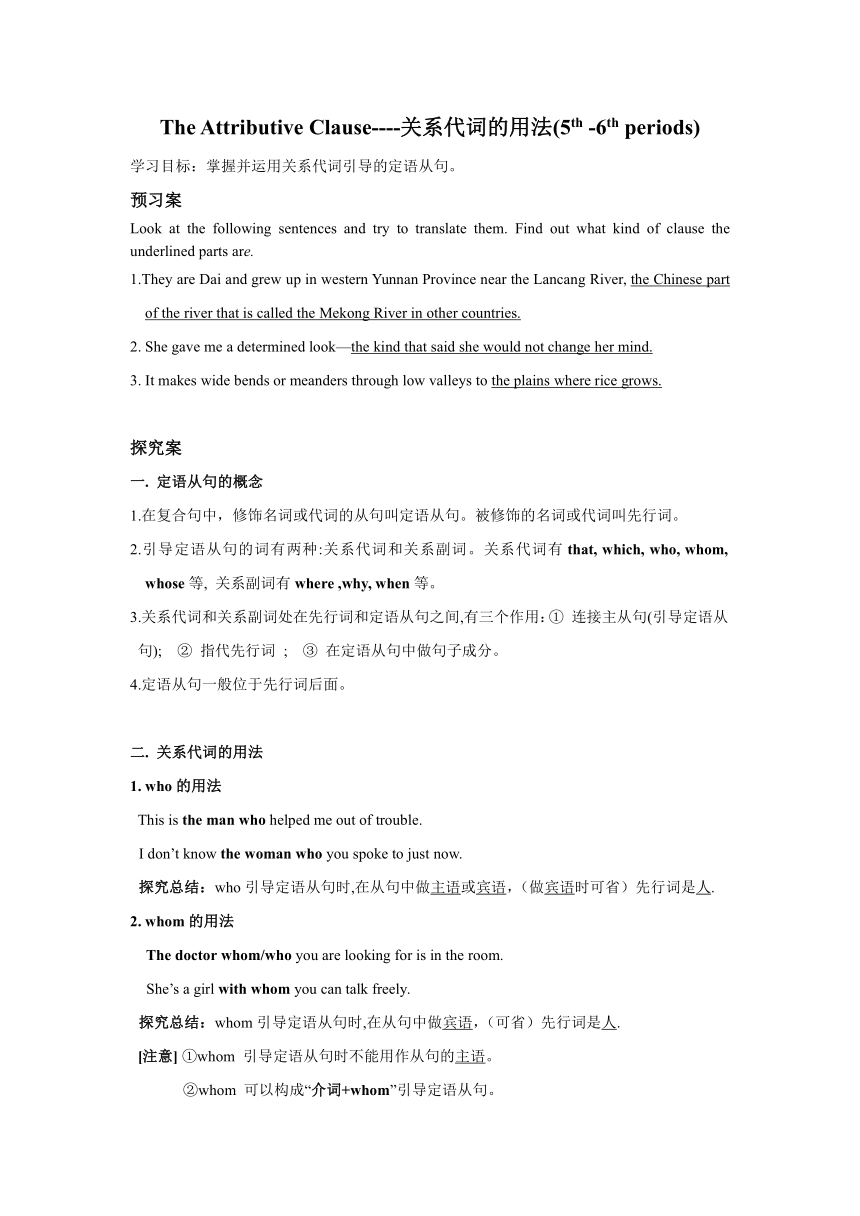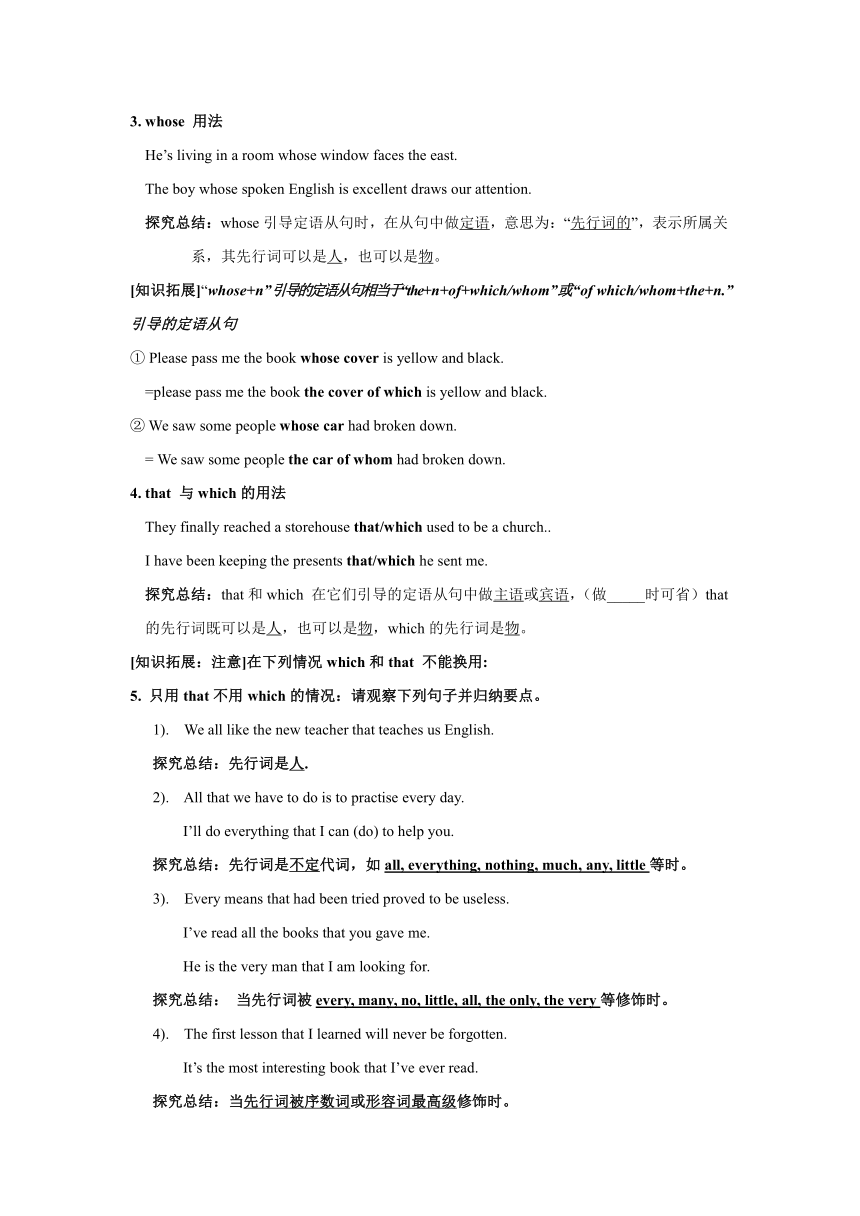人教版(新课程标准)必修一Unit4定语从句关系代词的用法学案(无答案)
文档属性
| 名称 | 人教版(新课程标准)必修一Unit4定语从句关系代词的用法学案(无答案) |

|
|
| 格式 | zip | ||
| 文件大小 | 21.6KB | ||
| 资源类型 | 教案 | ||
| 版本资源 | 人教版(新课程标准) | ||
| 科目 | 英语 | ||
| 更新时间 | 2022-01-24 15:50:10 | ||
图片预览


文档简介
The Attributive Clause----关系代词的用法(5th -6th periods)
学习目标:掌握并运用关系代词引导的定语从句。
预习案
Look at the following sentences and try to translate them. Find out what kind of clause the underlined parts are.
1.They are Dai and grew up in western Yunnan Province near the Lancang River, the Chinese part of the river that is called the Mekong River in other countries.
2. She gave me a determined look—the kind that said she would not change her mind.
3. It makes wide bends or meanders through low valleys to the plains where rice grows.
探究案
一. 定语从句的概念
1.在复合句中,修饰名词或代词的从句叫定语从句。被修饰的名词或代词叫先行词。
2.引导定语从句的词有两种:关系代词和关系副词。关系代词有that, which, who, whom, whose等, 关系副词有where ,why, when等。
3.关系代词和关系副词处在先行词和定语从句之间,有三个作用:① 连接主从句(引导定语从句); ② 指代先行词 ; ③ 在定语从句中做句子成分。
4.定语从句一般位于先行词后面。
二. 关系代词的用法
1. who的用法
This is the man who helped me out of trouble.
I don’t know the woman who you spoke to just now.
探究总结:who引导定语从句时,在从句中做主语或宾语,(做宾语时可省)先行词是人.
2. whom的用法
The doctor whom/who you are looking for is in the room.
She’s a girl with whom you can talk freely.
探究总结:whom引导定语从句时,在从句中做宾语,(可省)先行词是人.
[注意] ①whom 引导定语从句时不能用作从句的主语。
②whom 可以构成“介词+whom”引导定语从句。
3. whose 用法
He’s living in a room whose window faces the east.
The boy whose spoken English is excellent draws our attention.
探究总结:whose引导定语从句时,在从句中做定语,意思为:“先行词的”,表示所属关系,其先行词可以是人,也可以是物。
[知识拓展]“whose+n”引导的定语从句相当于“the+n+of+which/whom”或“of which/whom+the+n.”引导的定语从句
① Please pass me the book whose cover is yellow and black.
=please pass me the book the cover of which is yellow and black.
② We saw some people whose car had broken down.
= We saw some people the car of whom had broken down.
4. that 与which的用法
They finally reached a storehouse that/which used to be a church..
I have been keeping the presents that/which he sent me.
探究总结:that和which 在它们引导的定语从句中做主语或宾语,(做_____时可省)that的先行词既可以是人,也可以是物,which的先行词是物。
[知识拓展:注意]在下列情况which和that 不能换用:
5. 只用that不用which的情况:请观察下列句子并归纳要点。
1). We all like the new teacher that teaches us English.
探究总结:先行词是人.
2). All that we have to do is to practise every day.
I’ll do everything that I can (do) to help you.
探究总结:先行词是不定代词,如all, everything, nothing, much, any, little等时。
3). Every means that had been tried proved to be useless.
I’ve read all the books that you gave me.
He is the very man that I am looking for.
探究总结: 当先行词被every, many, no, little, all, the only, the very等修饰时。
4). The first lesson that I learned will never be forgotten.
It’s the most interesting book that I’ve ever read.
探究总结:当先行词被序数词或形容词最高级修饰时。
5). They talked of things and persons that they remembered in the school.
探究总结:当先行词既有人又有物时。
6). I hate the way (that)/ (in which) he talks to his wife.
探究总结:当the way做先行词且引导词在从句中做状语时,引导词用that或in which,也可省略。
7). Which is the book that you want
Who is the child that lost his key
探究总结:一些以which/who开头的特殊疑问句,为了避免重复,用that引导。
8). He is not the person that he was 30 years ago.
探究总结:关系代词在定语从句中作表语时(只限于限定性定语从句)。
[注意] that和who的先行词都是人,但有时只用who
He who doesn’t reach the Great Wall is not a true man. 不到长城非好汉。
A sports fan is someone who loves to play or watch sports.
Anyone who breaks the law should be punished.
God helps those who help themselves. 自助者天助。
探究总结:先行词是 ①人称代词 ②指人的不定代词③those指人
[注意]定语从句中谓语动词的单复数:
Do you know the boy who is(be) standing under the tree
Do you know the boys who are(be) standing under the tree
探究总结:如果关系代词在定语从句中作主语,谓语动词要与先行词保持一致.
She is one of the students who have(have) been to Beijing.
She is the only one of the students who has(have) been to Beijing.
知识拓展:6.as 的用法:(as 引导定语从句, 在定语从句中作主语、宾语、表语)
(1) 如为限制性的,多用于the same …as ; the same as;such …as …; as many/much as;so …as等结构中。如:
1. I have the same book as you (have). 我有一本和你的一样的书。
Her attitude to him was quite the same as it had always been. (关系代词as和指示代词same连用, 在从句中用作表语, 先行词是same.)
2.比较:I live in the same house that he used to live in.
I'm wearing the same shirt as you wore yesterday.
比较:Here is so big a stone as no one can lift. (定语从句)
Here is so big a stone that no one can lift it.(状语从句)
(2) 如为非限制性的,多单独引导一个定语从句,这种定语从句可置于句首,句中或句尾,译为"正如,这一点"。(动词常为know, see, expect, point out, etc.)
1. As we all know, smoking is harmful to one's health. (as 作宾语)
=As is known to all, smoking is harmful to one's health. (as作主语)
=It's known to all that smoking is harmful to one's health.
或:Smoking is harmful to one's health , as we all know .(as作宾语)
或: Smoking, as we all know, is harmful to one' health.
2. He was a foreigner, as I knew from his accent. (as 作宾语, 先行词是整个主句)
知识拓展:三 限制性定语从句与非限制性定语从句的区别:
1. 形式上,非限制性定语从句往往用逗号隔开。
2. 语法上,非限制性定语从句一般不用that.
3. 语义上,限制性定语从句与先行词关系紧密,起限定作用,如果去掉了这个定语从句,整个句子就不完整或者会改变意思;而非限制性定语从句与先行词关系不是很紧密,对先行词起补充说明或描述的作用。
1).This is the book I like best. 这就是我最喜欢的那本书。
2).Beijing, which has been China's capital for more than 800 years , is rich in cultural and historic relics. 北京是中国八百年之久的古都,它有着丰富的文化和历史遗产。
4. 翻译时,限制性定语从句可译为一句(较短的一般译为"的"字结构);而非限制性定语从句可译为两句。(见上句翻译)
比较: He has a sister, who is a musician. __________________________________
He has a sister who is a musician. __________________________________
巩固案: 定语从句练习
用适当的关系代词填空:
1. Do you like the present I bought you yesterday
2. The storybook _ was written by his uncle is quite interesting.
3. The boy computer doesn’t work well needs your help.
4. This is the best movie we have seen this year.
5. I don’t like the way _______ he speaks to his mother.
6. The passengers and the suitcases were in the waiting room had to wait for another plane.
7. Who is the girl you want to make friends with
8. This is the last lesson Mr. Smith taught us.
9. I, am your friend, will help you out.
The building _______wall is white is my uncle’s house.
The boy John spoke with is my brother.
Will you please lend me the very picture you bought yesterday
The students the teacher praised at the class meeting is our monitor.
The season comes after spring is summer.
This is the first museum we visited last Saturday.
The girl leg was broken in the earthquake was taken to the hospital.
I found some photos of interesting places were not far away from our city.
There is a boy downstairs _______ wants to see you.
The river _______ banks are covered with trees is very long.
I’m going to meet Tom they say is a good boy
学习目标:掌握并运用关系代词引导的定语从句。
预习案
Look at the following sentences and try to translate them. Find out what kind of clause the underlined parts are.
1.They are Dai and grew up in western Yunnan Province near the Lancang River, the Chinese part of the river that is called the Mekong River in other countries.
2. She gave me a determined look—the kind that said she would not change her mind.
3. It makes wide bends or meanders through low valleys to the plains where rice grows.
探究案
一. 定语从句的概念
1.在复合句中,修饰名词或代词的从句叫定语从句。被修饰的名词或代词叫先行词。
2.引导定语从句的词有两种:关系代词和关系副词。关系代词有that, which, who, whom, whose等, 关系副词有where ,why, when等。
3.关系代词和关系副词处在先行词和定语从句之间,有三个作用:① 连接主从句(引导定语从句); ② 指代先行词 ; ③ 在定语从句中做句子成分。
4.定语从句一般位于先行词后面。
二. 关系代词的用法
1. who的用法
This is the man who helped me out of trouble.
I don’t know the woman who you spoke to just now.
探究总结:who引导定语从句时,在从句中做主语或宾语,(做宾语时可省)先行词是人.
2. whom的用法
The doctor whom/who you are looking for is in the room.
She’s a girl with whom you can talk freely.
探究总结:whom引导定语从句时,在从句中做宾语,(可省)先行词是人.
[注意] ①whom 引导定语从句时不能用作从句的主语。
②whom 可以构成“介词+whom”引导定语从句。
3. whose 用法
He’s living in a room whose window faces the east.
The boy whose spoken English is excellent draws our attention.
探究总结:whose引导定语从句时,在从句中做定语,意思为:“先行词的”,表示所属关系,其先行词可以是人,也可以是物。
[知识拓展]“whose+n”引导的定语从句相当于“the+n+of+which/whom”或“of which/whom+the+n.”引导的定语从句
① Please pass me the book whose cover is yellow and black.
=please pass me the book the cover of which is yellow and black.
② We saw some people whose car had broken down.
= We saw some people the car of whom had broken down.
4. that 与which的用法
They finally reached a storehouse that/which used to be a church..
I have been keeping the presents that/which he sent me.
探究总结:that和which 在它们引导的定语从句中做主语或宾语,(做_____时可省)that的先行词既可以是人,也可以是物,which的先行词是物。
[知识拓展:注意]在下列情况which和that 不能换用:
5. 只用that不用which的情况:请观察下列句子并归纳要点。
1). We all like the new teacher that teaches us English.
探究总结:先行词是人.
2). All that we have to do is to practise every day.
I’ll do everything that I can (do) to help you.
探究总结:先行词是不定代词,如all, everything, nothing, much, any, little等时。
3). Every means that had been tried proved to be useless.
I’ve read all the books that you gave me.
He is the very man that I am looking for.
探究总结: 当先行词被every, many, no, little, all, the only, the very等修饰时。
4). The first lesson that I learned will never be forgotten.
It’s the most interesting book that I’ve ever read.
探究总结:当先行词被序数词或形容词最高级修饰时。
5). They talked of things and persons that they remembered in the school.
探究总结:当先行词既有人又有物时。
6). I hate the way (that)/ (in which) he talks to his wife.
探究总结:当the way做先行词且引导词在从句中做状语时,引导词用that或in which,也可省略。
7). Which is the book that you want
Who is the child that lost his key
探究总结:一些以which/who开头的特殊疑问句,为了避免重复,用that引导。
8). He is not the person that he was 30 years ago.
探究总结:关系代词在定语从句中作表语时(只限于限定性定语从句)。
[注意] that和who的先行词都是人,但有时只用who
He who doesn’t reach the Great Wall is not a true man. 不到长城非好汉。
A sports fan is someone who loves to play or watch sports.
Anyone who breaks the law should be punished.
God helps those who help themselves. 自助者天助。
探究总结:先行词是 ①人称代词 ②指人的不定代词③those指人
[注意]定语从句中谓语动词的单复数:
Do you know the boy who is(be) standing under the tree
Do you know the boys who are(be) standing under the tree
探究总结:如果关系代词在定语从句中作主语,谓语动词要与先行词保持一致.
She is one of the students who have(have) been to Beijing.
She is the only one of the students who has(have) been to Beijing.
知识拓展:6.as 的用法:(as 引导定语从句, 在定语从句中作主语、宾语、表语)
(1) 如为限制性的,多用于the same …as ; the same as;such …as …; as many/much as;so …as等结构中。如:
1. I have the same book as you (have). 我有一本和你的一样的书。
Her attitude to him was quite the same as it had always been. (关系代词as和指示代词same连用, 在从句中用作表语, 先行词是same.)
2.比较:I live in the same house that he used to live in.
I'm wearing the same shirt as you wore yesterday.
比较:Here is so big a stone as no one can lift. (定语从句)
Here is so big a stone that no one can lift it.(状语从句)
(2) 如为非限制性的,多单独引导一个定语从句,这种定语从句可置于句首,句中或句尾,译为"正如,这一点"。(动词常为know, see, expect, point out, etc.)
1. As we all know, smoking is harmful to one's health. (as 作宾语)
=As is known to all, smoking is harmful to one's health. (as作主语)
=It's known to all that smoking is harmful to one's health.
或:Smoking is harmful to one's health , as we all know .(as作宾语)
或: Smoking, as we all know, is harmful to one' health.
2. He was a foreigner, as I knew from his accent. (as 作宾语, 先行词是整个主句)
知识拓展:三 限制性定语从句与非限制性定语从句的区别:
1. 形式上,非限制性定语从句往往用逗号隔开。
2. 语法上,非限制性定语从句一般不用that.
3. 语义上,限制性定语从句与先行词关系紧密,起限定作用,如果去掉了这个定语从句,整个句子就不完整或者会改变意思;而非限制性定语从句与先行词关系不是很紧密,对先行词起补充说明或描述的作用。
1).This is the book I like best. 这就是我最喜欢的那本书。
2).Beijing, which has been China's capital for more than 800 years , is rich in cultural and historic relics. 北京是中国八百年之久的古都,它有着丰富的文化和历史遗产。
4. 翻译时,限制性定语从句可译为一句(较短的一般译为"的"字结构);而非限制性定语从句可译为两句。(见上句翻译)
比较: He has a sister, who is a musician. __________________________________
He has a sister who is a musician. __________________________________
巩固案: 定语从句练习
用适当的关系代词填空:
1. Do you like the present I bought you yesterday
2. The storybook _ was written by his uncle is quite interesting.
3. The boy computer doesn’t work well needs your help.
4. This is the best movie we have seen this year.
5. I don’t like the way _______ he speaks to his mother.
6. The passengers and the suitcases were in the waiting room had to wait for another plane.
7. Who is the girl you want to make friends with
8. This is the last lesson Mr. Smith taught us.
9. I, am your friend, will help you out.
The building _______wall is white is my uncle’s house.
The boy John spoke with is my brother.
Will you please lend me the very picture you bought yesterday
The students the teacher praised at the class meeting is our monitor.
The season comes after spring is summer.
This is the first museum we visited last Saturday.
The girl leg was broken in the earthquake was taken to the hospital.
I found some photos of interesting places were not far away from our city.
There is a boy downstairs _______ wants to see you.
The river _______ banks are covered with trees is very long.
I’m going to meet Tom they say is a good boy
